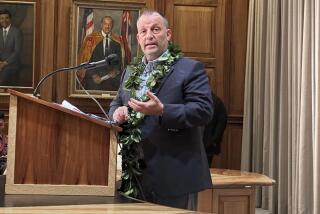Honda wins reversal of Civic hybrid small-claims judgment
- Share via
American Honda Motor Co. has won a reversal of a high-profile small-claims case that would have forced the automaker to pay a Los Angeles woman nearly $10,000 for overstating the fuel-economy claims on the Honda Civic hybrid.
Superior Court Judge Dudley W. Gray II ruled Tuesday that the automaker was within its rights to advertise the Environmental Protection Agency-derived fuel-economy ratings for the vehicle.
“Federal regulations control the fuel economy ratings posted on vehicles and advertising claims related to those fuel economy ratings,” Gray wrote in the ruling.
The judge also noted that the EPA’s estimated miles-per-gallon ratings are for comparison among vehicles and don’t take into account variations, such as how people drive and the conditions of their vehicles, that may affect fuel economy.
“Of course I’m disappointed,” said Heather Peters, who brought the suit, “but I’m still glad that I raised awareness that Honda is no longer the great brand that it used to be. They used to go the extra mile in customer service, now they go the extra mile fighting customers in court.”
Peters was ordered to pay Honda $75 in court fees. The court decision is final as California small-claims court rules do not allow for further appeals.
In a statement, Honda said it was “pleased with the Court’s decision which affirms that Honda was truthful in its advertising of the fuel economy potential of the 2006 Honda Civic Hybrid. We are thankful for the support we received from the many satisfied Civic Hybrid owners who expressed their support throughout the legal process.”
Last year, Peters launched a crusade attacking Honda’s fuel-economy claims and a class-action settlement that would pay trial lawyers $8.5 million while Civic hybrid owners would get as little as $100 to $200 each plus a rebate if they bought a new Honda.
She opted out of the settlement, created a DontSettleWithHonda.org website and filed the small-claims lawsuit against the company. After filing the case and then winning, Peters gained notoriety as an underdog fighting a giant corporation.
Peters, who had worked previously as an attorney and recently reactivated her license, said she believed that small-claims court would be the best venue for the case because it prevented Honda from using attorneys to mount a defense.
California law -- and statutes in some other states -- prohibits companies from using lawyers to mount a defense in small-claims court.
In February, Small Claims Court Commissioner Douglas Carnahan ruled that Honda negligently misled Peters when it claimed the hybrid could achieve as much as 50 mpg.
Honda said the ruling was a “radical and unprecedented departure from California and federal law” and filed its appeal.
Peters also encouraged other Civic owners to file similar complaints. Honda said it has successfully defended 18 such suits, including the Peters case through the appeal. Honda has lost one case, in Santa Barbara, involving a 2003 Civic hybrid.
The automaker, however, has acknowledged problems with 2006 through 2008 Civic hybrids. Previously it has said that the battery that helps power the vehicles “may deteriorate and eventually fail” earlier than expected. When the battery pack can’t be charged to full capacity, the car relies more on the gas engine and fuel economy suffers.
RELATED:
Zipcar CEO likes the shared economy
War veterans more likely to crash cars
Female drivers more likely to hit wrong pedal
More to Read
Inside the business of entertainment
The Wide Shot brings you news, analysis and insights on everything from streaming wars to production — and what it all means for the future.
You may occasionally receive promotional content from the Los Angeles Times.











